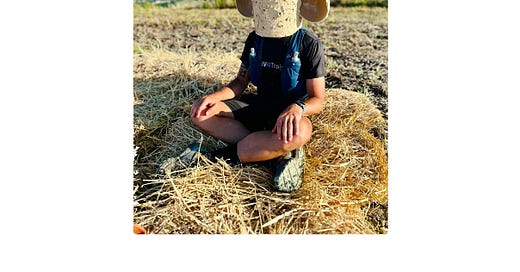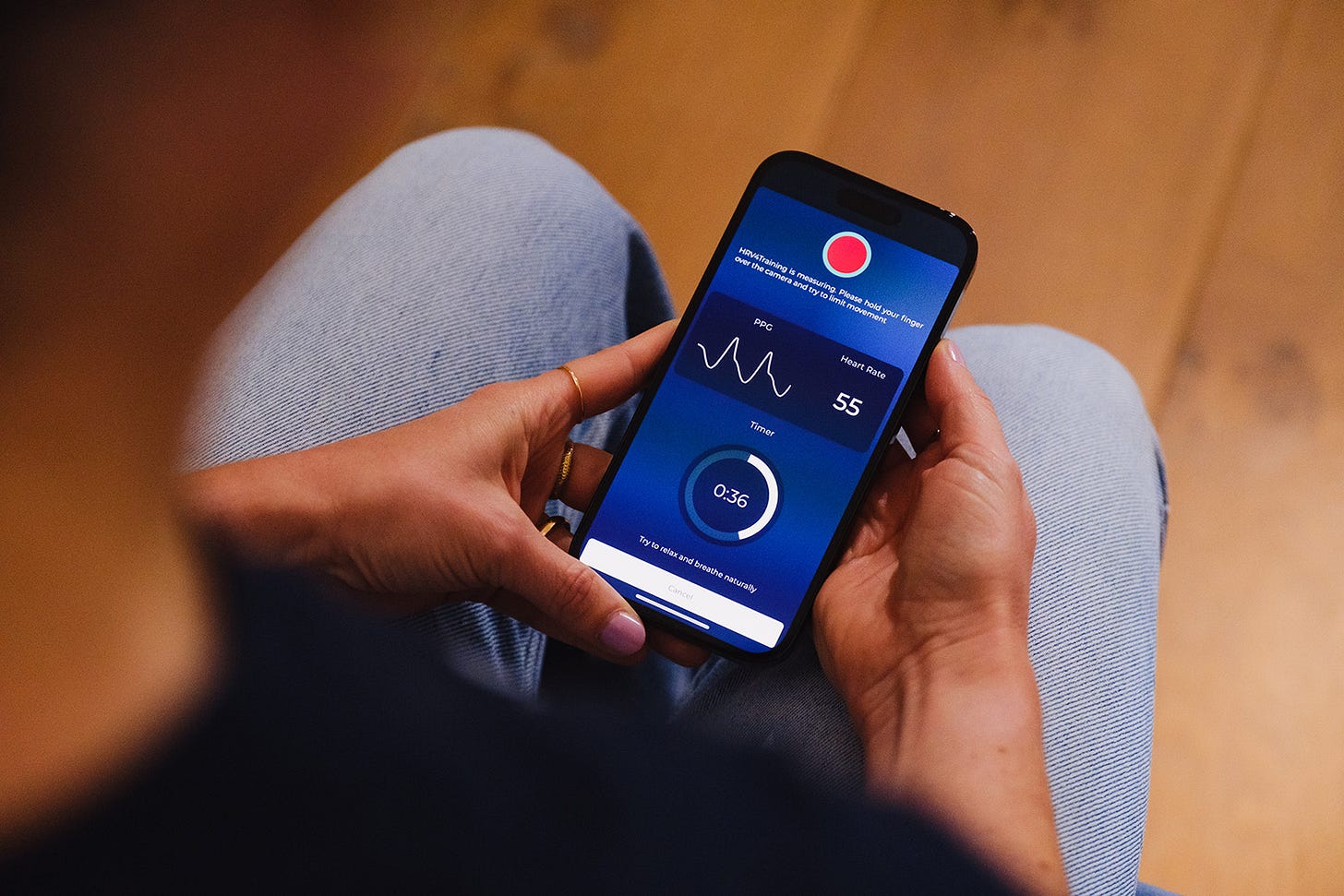Recent articles and updates [June 2024]
heart rate variability, wearables, entrepreneurship, training talk and some ramblings
hi there 👋
I hope all is well.
Here is my newsletter including articles and updates from June 2024. I hope you’ll find it useful and I would like to take the opportunity to thank you for your support.
Please feel free to comment below or in the articles should you have any questions, and I will follow up soon.
Take care!
Heart rate variability (HRV) 🫀
HRV and performance. HRV doesn't determine our ability to perform, which is why we can always do great workouts (or races) on a 'low HRV day'. Anecdotes of this happening should be no surprise (especially for races, where disruption in our routine or psychological stressors often can lead to a 'more sympathetic response', without any issues in terms of performance). It is perfectly normal to race well or do a great session on a low HRV (another myth that should go). Learn more, here.
Resting heart rate and HRV by activity level and age. What is the relationship between resting physiology, activity level, and age, and how does this differ for resting heart rate and HRV? Here is an overview.

Wearables ⌚️
Pitfalls of estimates. The rhetoric of individualization through wearables data with the current focus on estimates doesn't hold water. We build generic models using large-scale population data that shows certain relationships. We then provide them to the individual claiming that these models can track health and / or performance at the individual level. Keep reading, here.
Objective and subjective. A question that often comes up, is on the relationship between subjective and objective data. Should objective and subjective data be aligned and reflect the same? Is your resting physiology supposed to show you what you already know based on your subjective feeling? Maybe sometimes, but in my opinion, it is not so simple, which doesn't mean tracking them is not useful. More considerations, here.
Papers 📝
2024. R.J. Burden, M. Altini, E. Ferrer, T. Flood, G. Lewin, S. Nimphius, S.M. Phillips, K.J. Elliott-Sale, "Measure don’t guess; a call to end assumed and estimated menstrual cycle phases in research and practice". BMJ.
Last year I was asked to give a talk about wearables for the Gatorade Sports Science Institute (GSSI). I had been thinking about this for a while, with the goal of providing a more nuanced view of what you often find on the topic (i.e. fanboys vs anti-technology people). I ended up classifying metrics into measurements and estimates, something we can quite clearly differentiate (i.e. is there a sensor that can actually measure the parameter of interest, or are we just estimating / guessing it based on somewhat related parameters?). This framework (which you can find covered in greater detail here) was then picked up a few times, and I was really glad to see it was resonating well with others. Read on, here.
2024. M. Mirto, L. Filipas, M. Altini, R. Codella, A. Meloni. "Heart Rate Variability in Professional and Semi-Professional Soccer: A Scoping Review". Scandinavian Journal of Medicine and Science in Sports.
Podcasts 🎙️
NoJetStress, a conversation with Christopher Babayode. The NoJetStress Podcast is a traveler wellbeing podcast for frequent business travelers covering health and peak performance on the road as well as to help business travelers maintain optimal health and avoid burnout no matter how much they travel. Christopher Babayode, a Corporate Travel Wellness Expert shares his insights on Traveler Wellness. You can find my episode here.
🇮🇹 Grazie a Stefano e Daniele per questa intervista su "Hai voluto la bicicletta?.." Episodio 38: Utilizzo della variabilità cardiaca (HRV): intervista a Marco Altini.
Training talk 🏃🏻♂️🚴
Mid-year training recap and adjustments. My training year ends after Passatore, more or less halfway through the calendar year. As such, this is a good time to look at training, how things are progressing, what went well, and what could be improved. This blog is a short recap covering these aspects.
Training log. As the name says, this is simply my training diary for this year.
That’s a wrap for this month.
Thank you for reading, and see you next month.
Recent newsletters:
Marco holds a PhD cum laude in applied machine learning, a M.Sc. cum laude in computer science engineering, and a M.Sc. cum laude in human movement sciences and high-performance coaching.
He has published more than 50 papers and patents at the intersection between physiology, health, technology, and human performance.
He is co-founder of HRV4Training, advisor at Oura, guest lecturer at VU Amsterdam, and editor for IEEE Pervasive Computing Magazine. He loves running.
Social:









Hi Marco, thanks a lot for all of the information you have provided. I have recently trying to set up a sytem of taking HRV measurements regularly to aid in assessing recovery for endurance training. I've read a lot of your writing and advice on this, so I have set up a routine to take my HRV and RHR in the morning, using the phone app, sitting up.
As a little background, I think I am suffering from overtraining at the moment, Im not sure how severe, but I have been getting sick quite often, and failing to recover. I had a serious injury last year, and pushed too hard in training following that for a race. I am now trying to focus on recovery over all else, but I am still trying to pull myself out of the hole a bit.
What I am having difficulty with, is when taking a morning measurement, my HR spikes and HRV dips a bit after waking up and sitting up, often by quite a lot. Say my sleeping HR just before waking is ~40-45. My sitting HR can be ~70-75 bpm just after waking. If I wait and relax for 1min or so, it can drop a bit. If I wait 5min, it will drop further. What I want to know is, obviosuly this impacts the data I am taking, so how long should I relax while sitting up (post bathroom sometimes, which can add time but isn't every morning).
I think this spike in HR and dip in HRV is a sign of autonomic nervous system stress from overtraining and a need for recovery, which I am trying to improve, but the question still remains. Even in very recovered people, they would see this effet (after all, that orthostatic stressor is what we are trying to get). How long do you recommend you wait, and how important is it to be consistent with that time? I feel sometimes if I take it straight away after waking up, its is not indicative of my true RHR or HRV, but maybe I'm wrong, and its a sign that I really should take it easier. But It doesn't seem to reflect the values from the rest of the day, or sometimes how I feel.
Thanks a lot, I hope you can shed some light on this, I am a big fan of your writing, I think you are more objective than most on this stuff. But as I'm sure you are aware, it is only useful if the data is good and the measurements are consistent, data for the sake of it is not much good. Thanks a lot :)
You've shared a tremendous volume of knowledge Marco—thank you. I wonder about the relevance of an HRV measurement performed over a few minutes after waking with regard to forecasting the performance potential in the next few hours. So, fundamentally, I'm curious about the usefulness of one night's average, trending that over days, weeks , and months to measure the effects of a lifestyle change—think Oura RIng, and a waking measurement. My personal context is that of a senior citizen seeking to maximize his healthspan. I'm a biomedical engineer who began in cardiac rhythm management and, for the past 20 years, therapies for people managing Type 1 diabetes.